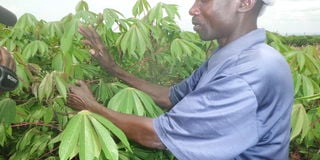Prime
The future of plant breeding technology

Cassava resistant to cassava Mosaic and brown Streak Virus at the research field in Mubuku, Kasese. PHOTO | LOMINDA AFEDRARU
What you need to know:
- The Reach Project closed out last week after four years of helping rice and Irish potato farmers with a market-based approach. But the experts say liberalised rice imports are hurting the farmers.
Agricultural research in Uganda started with involvement of communities and farmers with
the colonial British introducing cotton for farmers to grow as a cash crop. This was after the establishment of botanical gardens in 1898 for the evolution of crops that
could be grown for export and food security.
Research quadrupled between1995 and 2008 after the establishment of the National Agricultural Research Organisation (Naro) in 2005 to supplement the work of the National Agricultural Research Laboratories (NaRL) and the National Crops Resources Research Institute (NaCRRI).
Agricultural scientists were recruited to work in these institutes and with donor funds, research work
was boosted.
New direction
Now there is a new approach where scientists both in the health and agricultural sector are using technologies such as gene therapy, biotechnology and gene editing among others to advance crop breeding and health issues.
This was revealed during the 10th anniversary celebration of Uganda Biotechnology and Biosafety Consortium (UBBC), a science body formed in 2012.
The chairperson of UBBC Dr Peter Wasswa notes that the organisation was formed to enhance scientific conversation in application of advanced science technologies.
Todate, UBBC has grown with membership including science students in Universities pursuing health science and agricultural science including stakeholders involved in scientific innovations and scientists.
Dr Wasswa explains that there are several scientific challenges now including environmental issues arising from climate change. Other challenges are pest and diseases ravaging crops in the agricultural sector therefore the need to apply technologies such as gene editing and advanced biotechnology to breed crops to resists these diseases including developing animal vaccines against tick borne
diseases.
The coordinator of UBBC Arthur Makara explains that it is important to celebrate the 10-year milestone.
He says the body has helped in sensitising communities about science in developing consumable products.
Dr Andrew Kiggundu, a senior research scientist at Naro notes that a new approach is now being used by scientists involving communities and farmers to address challenges in agriculture food system.
He contends that scientists at Naro have bred crops such Vitamin A cooking banana, varieties resistant to banana bacterial wilt, black sigatoka and pests such as nematodes as well as cassava which is resistant to Cassava Brown Streak and Cassava Mosaic. There are also maize varieties which are resistant to Maize Stalk Borer and rice that can grow in infertile soils.
Some of the technology include developing tissue culture banana cuttings and hybrid agricultural products as food security tool.
Gene therapy
Dr Kiggundu explains that scientists transfer genes from one organism to another to addresses challenges of pests and diseases in plants to address health challenges as well as animals.
He also notes that gene editing has been used by agricultural scientists to shorten breeding
Periods.
Gene editing tools are helping breeders to modify target genes to the desired sequence for improving crop yield and quality and increase biotic and abiotic stress tolerance and herbicide resistance in crops.
The scientists use CRISPR-Cas9 system that modifies DNA with great accuracy. This technology is also helpful in animal breeding where the ovaries can be edited against diseases and inserted in surrogate cows that will produce healthy calves.
The technology has been used by scientists in genetic bio controls such as mosquitoes bred by scientists in Senegal and Uganda to help solve the challenge of malaria spread.
Regulation
Dr Kiggundu contends that it is important to ensure all countries have laws to regulate use of these technologies otherwise anti science advocates will end up inventing things beyond the science.
In some countries, they had laws that govern use of advanced biotechnology but they are being amended to include gene editing and gene therapy regulations.
However, plants developed conventionally require laws for their release.
In Uganda, there is the Genetic Engineering Regulations Act (GERA) which scientists and legislators are currently modifying to encompass regulations of all advanced technology including gene therapy, gene editing and use pf gene drive.
Perspective
The Chairperson of National Union of Coffee Agribusinesses and Farm Enterprises (NUCAFE) Dr Gerald Sendawula notes that there was a challenge of coffee wilt disease which ravaged coffee fields across the country causing yield loss in the 1990’s. However, when scientists released coffee varieties resistant to coffee wilt, the production increased. Consequently, Uganda has seen a steady rise in coffee export volumes which had stagnated at 3.5m 60kg bags.




